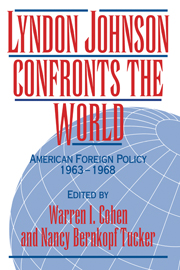Book contents
- Frontmatter
- Contents
- Dedication
- Acknowledgments
- List of Contributors
- Introduction
- 1 Lyndon B. Johnson: Change and Continuity
- 2 Johnson, Vietnam, and Tocqueville
- 3 “A Time in the Tide of Men's Affairs”: Lyndon Johnson and Vietnam
- 4 Threats, Opportunities, and Frustrations in East Asia
- 5 Toward Disillusionment and Disengagement in South Asia
- 6 Lyndon B. Johnson, Germany, and “the End of the Cold War”
- 7 The Promise of Progress: U.S. Relations with Latin America During the Administration of Lyndon B. Johnson
- 8 Keeping Africa off the Agenda
- 9 Balancing American Interests in the Middle East: Lyndon Baines Johnson vs. Gamal Abdul Nasser
- 10 Lyndon Johnson: A Final Reckoning
- Suggestions for Further Reading
- Index
8 - Keeping Africa off the Agenda
Published online by Cambridge University Press: 05 June 2012
- Frontmatter
- Contents
- Dedication
- Acknowledgments
- List of Contributors
- Introduction
- 1 Lyndon B. Johnson: Change and Continuity
- 2 Johnson, Vietnam, and Tocqueville
- 3 “A Time in the Tide of Men's Affairs”: Lyndon Johnson and Vietnam
- 4 Threats, Opportunities, and Frustrations in East Asia
- 5 Toward Disillusionment and Disengagement in South Asia
- 6 Lyndon B. Johnson, Germany, and “the End of the Cold War”
- 7 The Promise of Progress: U.S. Relations with Latin America During the Administration of Lyndon B. Johnson
- 8 Keeping Africa off the Agenda
- 9 Balancing American Interests in the Middle East: Lyndon Baines Johnson vs. Gamal Abdul Nasser
- 10 Lyndon Johnson: A Final Reckoning
- Suggestions for Further Reading
- Index
Summary
Lyndon Johnson assumed the presidency in November 1963 with a crowded agenda of difficult and challenging issues both at home and abroad. Africa occupied a peripheral position on Johnson's list of priorities, and the president sought to avoid the diversion of attention or resources to the continent. The euphoria and optimism of the early 1960s as dozens of new states achieved independence, ready to play an important role in John Kennedy's New Frontier, had faded. From Johnson's perspective, Africa was best kept on the back burner, handled by the State Department bureaucracy or ignored as much as possible. Africa was the farthest corner of the world to Johnson, the place to threaten to send indiscreet officials who drew his ire. The Great Society at home, the obsession with fighting the war in Vietnam, and other more important areas of the world all deserved and received greater attention. As one official put it, Africa was “the last issue considered, the first aid budget cut.” Only occasionally – such as when the Congo threatened to erupt into a major crisis in 1964, when African issues required a decision at the United Nations, or when domestic interest groups generated enough attention to make an issue salient – did Johnson have to face decisions regarding the continent. Otherwise, the administration successfully kept Africa off the agenda.
- Type
- Chapter
- Information
- Lyndon Johnson Confronts the WorldAmerican Foreign Policy 1963–1968, pp. 245 - 278Publisher: Cambridge University PressPrint publication year: 1995
- 1
- Cited by



